Northwest Vipassana Center Preparing to
Offer Long-Term Practice With Individual Cells
Written by: Julie Schaeffer
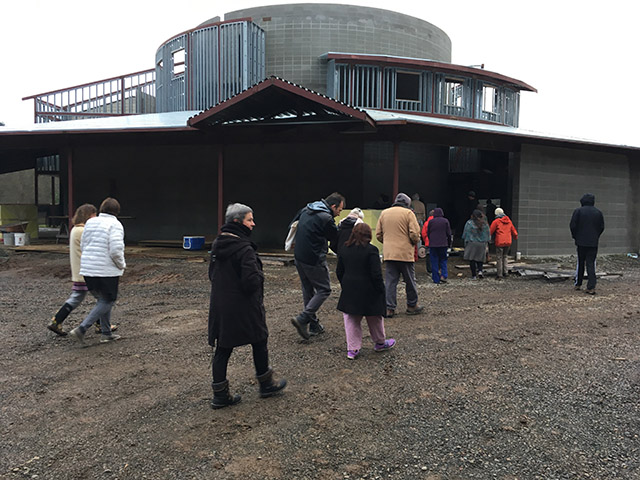
At the end of a course, students tour the first level of the pagoda.
All photographs: credit to Northwest Vipassana Center
Work has resumed at Northwest Vipassana Center on an assemblage of small meditation cells, all housed in a three-story pagoda, which will greatly expand future opportunities for deep meditation.
Volunteers and contractors are again working on the $4.5 million project in Onalaska, Washington. Construction was halted in early 2020, with the onset of the Covid-19 pandemic.
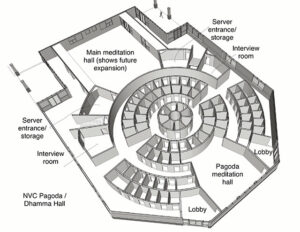
Floor plan illustrates cells and future expansion of the larger meditation hall.
Meanwhile regular 10-day meditation courses, taught by S.N. Goenka through recorded teachings and presented by assistant teachers, also have been gradually resuming on-site since mid-2021. Leaders plan to increase on-site capacity further in 2022, as public health conditions allow.
The pagoda project will transform people’s ability to practice at the site, by offering the meditation cells that have long been a feature of long-term retreats in India. Since the 1970s, serious meditators have travelled to India to join in long courses.
In recent years three Vipassana centers in North America have built pagodas to serve the ever-growing desire to sit long courses. However, these courses always fill quite quickly, with long waiting lists.
Many Pacific Northwest meditators in this tradition are rejoicing, now that a local center will soon be supporting them in deepening their progress on the dhamma path. The long courses are restricted to students who fulfill a number of requirements, including completing multiple 10-day courses.
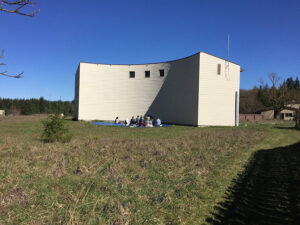
A group meditation next to the back wall of the meditation hall, where the pagoda is rising.
Experienced volunteers are building 71 individual cells, two interview rooms, and walkways on the first level, and staining the concrete floors. The volunteers also are overseeing contractors working on the electrical system, as well as heating, cooling and ventilation equipment.
In March 2020 a contractor completed construction of the three-level concrete-and-steel pagoda shell, a year after work started. But with the onset of covid the interior work, which was to have been completed largely by volunteers, was paused.
When completed each small cell will have a door, ventilation, a light, and enough space for one person to meditate in seclusion. Cells on the upper levels will bring the total number to 130. Construction will continue as offerings (dāna) permits.
A long-term vision for the Northwest Vipassana Center, also called Dhamma Kuñja, is to develop into an ideal center for longer courses of 30, 45 and 60 days, for which cells and private accommodations are required.
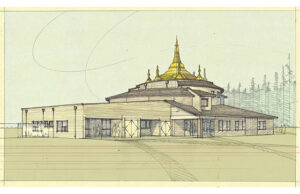
An artist’s rendition of the pagoda and meditation hall.
With the cells the distractions—and the support—of meditating in a group are lessened. In turn meditators’ self-reliance is strengthened, and many find they are able to go deeper in the practice.
During regular 10-day retreats students also will have opportunities to meditate in cells, as well as in the hall with other students.
Building individual cells inside a pagoda-shaped building was an innovation of Sayagyi U Ba Khin, the Burmese meditation master and teacher of S.N. Goenka. Traditionally these buildings are topped with one or more zedis, symbolic structures representing variously an upturned alms bowl, lotus petals, a banana bud, or an umbrella. Smaller zedis encircle a central zedi.
At Dhamma Kuñja eight small zedis are on site now, with the large zedi patiently awaited. The zedis pay homage to Burma (Myanmar) as a sacred repository of dhamma teachings, and also inspire meditators.
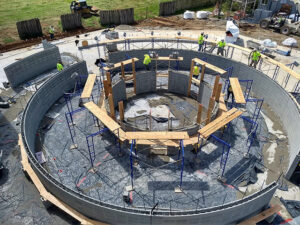
Concrete blocks form the round walls while giving strength and durability.
Site development has long been focused on eventual construction of the cells, pagoda and zedis.
In 2002 Architect David Boe designed the large meditation hall for 80 with a future pagoda firmly in mind. That hall features a curved rear wall, against which the round pagoda is now nestled. New residential buildings were added from 2009 through 2011.
Prior to construction of large hall, a large house on the 50-acre campus provided housing, kitchen, dining and accommodations, and a smaller hall that seated 42 students.
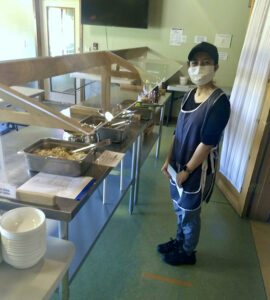
Course volunteer Khin Khin Daw checks the lunch offerings.
Shortly after the center was purchased in 1991, S.N. Goenka visited the site. Upon seeing the two large groves of trees on the property, Goenka gave the new meditation center the Pāli name Dhamma Kuñja, which means the “grove of dhamma.” He also indicated the site for the pagoda now being built.
In this tradition all courses and development projects are funded solely by donations (dana) from “old students.” This refers to those who have completed the 10-day Vipassana meditation course, which is a feature of this tradition.
Pandemic changes
Apart from this construction program, these regular 10-day courses have been gradually and carefully resumed in the wake of the initial Covid shutdown.
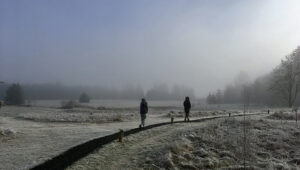
Students walk to the dining hall on a frosty morning.
Regular 10-day courses resumed for both new and old students in March of 2021, a year after the first onslaught of the pandemic. But attendance has been limited to 50 percent of capacity, to allow for private rooms and greater distancing in the dhamma hall.
Covid vaccination has been required for attendance since becoming widely available in August of 2021. Masks are required in public areas, including in the dhamma hall. Currently all students take meals in their private rooms.
These measures will continue until no longer needed. In addition we have taken steps to improve ventilation, by upgrading or adding air exchange and purification systems in the dining rooms and meditation halls.
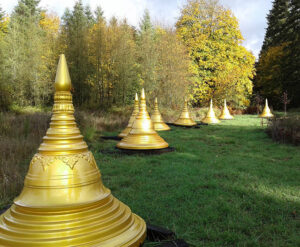
These eight small zedis will be placed atop the pagoda roof.
The very first re-opening started in July, 2020, with very-small courses limited to previous students. A re-opening committee was formed to plan, implement and review safety measures, and they meet regularly to review and revise protocols.
With the onset of COVID-19 in March, 2020, the center closed to retreats, with just a handful of students remaining on-site to maintain the facility. Those people also maintained a regular meditation schedule, and sat 10-day self-courses.
During the shut-down leaders set up online group meditation sessions, which continue to provide much-appreciated opportunities for seasoned students to meditate together for an hour or for a day.
Assistant teachers lead these sessions, and are also available to answer questions. This daily support, plus a phone app, are helping meditators sustain and strengthen their daily practices even when group sittings are not available.
Northwest Vipassana Center has offered a full schedule of courses for the past 30 years, including introductory courses for children and teens, regular 10-day courses, bilingual courses for foreign language speakers, and satipatthana and 20-day courses. Recently the center has offered courses for LGBTQ+ people, and a Black heritage course.
Information about courses and how to apply can be found at www.kunja.dhamma.org.
May all beings be happy!
Julie Schaeffer is a member of the NVC Communications Committee, and a long-time volunteer at Dhamma Kuñja. In 1978 she completed her first course with S.N. Goenka in India at Dhamma Giri, one of the tradition’s largest and first centers. She has served the tradition in many ways since then.
